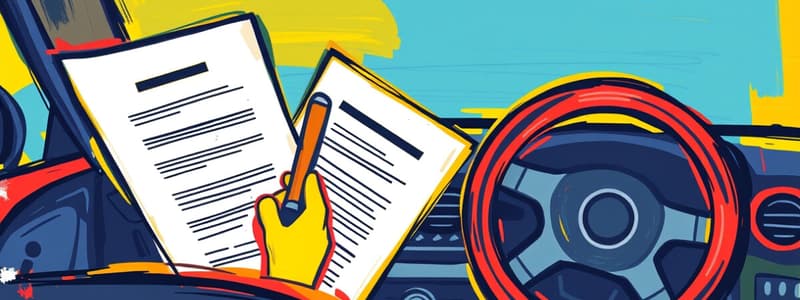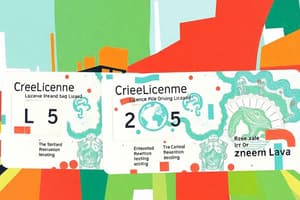Podcast
Questions and Answers
What is required for every motor vehicle on a public road?
What is required for every motor vehicle on a public road?
- An insurance policy (correct)
- A valid driver's license
- A registration sticker
- An emissions test certificate
What is the primary aim of the lesson on driving documents?
What is the primary aim of the lesson on driving documents?
- To provide a history of car insurance
- To explain legislation covering driving documents (correct)
- To discuss vehicle maintenance requirements
- To summarize traffic laws in various countries
Which section of the Road Traffic Act outlines offences related to driving documents?
Which section of the Road Traffic Act outlines offences related to driving documents?
- Section 143 and 144A (correct)
- Section 150
- Section 142
- Section 145
What can happen if a motor vehicle is not covered by insurance?
What can happen if a motor vehicle is not covered by insurance?
Which of the following is NOT an outcome of the lesson on driving documents?
Which of the following is NOT an outcome of the lesson on driving documents?
Why is monetary compensation necessary for vehicle use on the road?
Why is monetary compensation necessary for vehicle use on the road?
What is the offence created under Section 143 of the Road Traffic Act 1988?
What is the offence created under Section 143 of the Road Traffic Act 1988?
What must a keeper do if they wish to keep a vehicle but not insure it?
What must a keeper do if they wish to keep a vehicle but not insure it?
Under what condition does Section 144A of the Road Traffic Act 1988 apply?
Under what condition does Section 144A of the Road Traffic Act 1988 apply?
Which of the following must be proven to avoid conviction for driving without insurance under Section 143?
Which of the following must be proven to avoid conviction for driving without insurance under Section 143?
What is required for a vehicle to not need insurance according to the Road Traffic Act?
What is required for a vehicle to not need insurance according to the Road Traffic Act?
If a driver is using a vehicle for employment, which of the following must be true to avoid charges of driving without insurance?
If a driver is using a vehicle for employment, which of the following must be true to avoid charges of driving without insurance?
What does the keeper need to complete if removing a vehicle from public places and not insuring it?
What does the keeper need to complete if removing a vehicle from public places and not insuring it?
What is the main purpose of requiring vehicle insurance on public roads?
What is the main purpose of requiring vehicle insurance on public roads?
What section of the Road Traffic Act 1988 relates specifically to driving documents and insurance?
What section of the Road Traffic Act 1988 relates specifically to driving documents and insurance?
What is the primary focus of Unit 9, Lesson 2.1?
What is the primary focus of Unit 9, Lesson 2.1?
Which resource can be consulted for further details on road traffic law?
Which resource can be consulted for further details on road traffic law?
What should one consider after completing the lesson regarding driving documents?
What should one consider after completing the lesson regarding driving documents?
Which lesson unit is focused on driving documents?
Which lesson unit is focused on driving documents?
Which of the following offences are established by the Road Traffic Act 1988?
Which of the following offences are established by the Road Traffic Act 1988?
What is one of the learning outcomes expected from the lesson on driving documents?
What is one of the learning outcomes expected from the lesson on driving documents?
What type of documentation is highlighted as essential for legal driving?
What type of documentation is highlighted as essential for legal driving?
What form must be completed when recording details of produced documents?
What form must be completed when recording details of produced documents?
Under what circumstance can a vehicle be seized according to Section 165A of the Road Traffic Act 1988?
Under what circumstance can a vehicle be seized according to Section 165A of the Road Traffic Act 1988?
What must be true for the officer to seize a vehicle after stopping it?
What must be true for the officer to seize a vehicle after stopping it?
What happens to a vehicle once it is seized by the police?
What happens to a vehicle once it is seized by the police?
What action should be taken if sufficient evidence exists against the driver?
What action should be taken if sufficient evidence exists against the driver?
If motoring documents are available on PNC, what does it imply?
If motoring documents are available on PNC, what does it imply?
How should the police respond to instances of unproduced documents?
How should the police respond to instances of unproduced documents?
What is not an alternative to prosecution once a vehicle is seized?
What is not an alternative to prosecution once a vehicle is seized?
Which type of vehicle is exempt from section 143 of the Road Traffic Act, 1988?
Which type of vehicle is exempt from section 143 of the Road Traffic Act, 1988?
Which scenario provides a statutory defense under section 143 when lacking insurance?
Which scenario provides a statutory defense under section 143 when lacking insurance?
In which situation can a police officer require the production of an insurance certificate?
In which situation can a police officer require the production of an insurance certificate?
What action can a police officer take if they witness a motoring offence?
What action can a police officer take if they witness a motoring offence?
Which driver scenario does NOT qualify for statutory defense under section 143?
Which driver scenario does NOT qualify for statutory defense under section 143?
What is a requirement for producing an insurance certificate?
What is a requirement for producing an insurance certificate?
What is the implication of not having insurance or cover for third-party risks?
What is the implication of not having insurance or cover for third-party risks?
Which situation requires police verification of insurance?
Which situation requires police verification of insurance?
Study Notes
Driving Documents - Insurance
- Motor vehicles on public roads must have an insurance policy to cover potential injury or damage.
- Section 143 of the Road Traffic Act 1988 prohibits using or allowing the use of a motor vehicle without valid insurance covering third-party risks.
- If a vehicle is uninsured and not on the road, the keeper must remove it from public places and notify the DVLA through a Statutory Off Road Notice (SORN).
- Section 144A of the Road Traffic Act 1988 holds the registered keeper liable if the vehicle is uninsured, regardless of its use.
Offences and Defences
- An offence under Section 143 applies if no SORN exists and the vehicle is uninsured.
- A statutory defence exists under Section 143, protecting those who can prove:
- The vehicle does not belong to the driver.
- The vehicle is not hired by the driver.
- The driver is operating the vehicle within their employment duties.
- Police can seize a vehicle if the driver fails to present a driving license or insurance certificate, with reasonable grounds for belief of an offence under Sections 87(1) or 143.
Exemptions and Examples
- Certain vehicles are exempt from Section 143, but examples such as:
- Driving a company vehicle believing it is insured.
- Going to a scrap merchant with an uninsurable vehicle.
- Leaving a disused vehicle unattended.
- Driving to an insurance broker to renew insurance may not have statutory defences.
Requirements for Producing Documents
- Police officers can demand the production of an insurance certificate or cover note under the following conditions:
- When the person is driving on a road.
- When the person is suspected of committing a motoring offence.
- Following involvement in a road collision.
- If the officer witnesses an offence directly.
Review and Reflection
- Understanding the implications of Sections 143 and 144A of the Road Traffic Act 1988 is crucial for compliant road use.
- Reflect on how this knowledge influences daily responsibilities and identify areas for further skill development.
Studying That Suits You
Use AI to generate personalized quizzes and flashcards to suit your learning preferences.
Related Documents
Description
This quiz focuses on the legal aspects of driving documentation, particularly insurance, as covered in Unit 9 Lesson 2.1. Learners will explore various legislations related to driving documents and insurance requirements to enhance their understanding of the topic.




